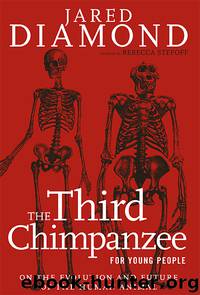The Third Chimpanzee for Young People by Jared Diamond

Author:Jared Diamond
Language: eng
Format: epub
Tags: third chimpanzee, jared diamond, YA, rebecca stefoff, adaptation, evolution, origin of species, human evolution, apes, biology, evolutionary biology, the great leap forward, sexuality, race, gender, aging, gerontology, language, linguistics, art, art history, agriculture, food, cultivation, drug abuse, chemical abuse, self-destructive behavior, extraterrestrial life, first contact, geography, civilization, hunter-gatherers, domestication, extinctions, genocide, expansion, generation
Publisher: Seven Stories Press
Published: 2014-04-07T16:00:00+00:00
Class Divisions
Farming brought another curse to humanity: class divisions. Hunter-gatherers have little or no stored food, and no concentrated food sources such as orchards or herds of cows. They live off wild plants and animals that they obtain each day, and everyone except infants, the sick, and the old joins in the search for food. There are no kings, no fulltime professional experts, and no social parasites who grow fat off the work of others.
Only a farming population could develop contrasts between the disease-ridden masses and a healthy elite class that is rich or powerful but produces nothing. We see an example of this contrast in skeletons from Greek tombs of around 1500 BC. These remains suggest that royals enjoyed a better diet than commoners. The royal skeletons, for example, were two or three inches taller than those of commoners. Royal mouths contained an average of one cavity or missing tooth, compared with six for the commoners. Something similar shows up in remains from South America. Mummies from three-thousand-year-old cemeteries in Chile show that elites—who were buried with ornaments and gold hair clips—had a rate of bone damage from infectious diseases that was four times lower than the common rate.
To most American and European readers, the idea that humanity could have been better off as hunter-gatherers than we are today sounds ridiculous, because most people in modern industrial societies enjoy better health than hunter-gatherers. They are the elite in today’s world, however. They depend on oil and other resources imported from countries that have large peasant populations and much lower health standards.
Some people in industrial and farming societies enjoy more leisure than hunter-gatherers—but this is at the expense of many others who support them and have less leisure. Farming undoubtedly made it possible for societies to support full-time artists and craftspeople, without whom we would not have large-scale art projects such as temples and cathedrals. But great paintings and sculptures on a smaller scale were already being produced by Cro-Magnon hunter-gatherers fifteen thousand years ago, and great art was still produced into modern times by hunter-gatherers such as the Pacific Northwest Indians. And when we think of the specialists whom society became able to support after the shift to agriculture, we should think not just of Shakespeare and Leonardo da Vinci but also of huge armies of professional killers.
A Prehistoric Crossroads
Farming could support far more people than hunting—even if it did not always bring more food to each mouth. Population densities of hunter-gatherers are usually one person or fewer per square mile, while densities of farmers are at least ten times that.
Maybe the main reason we find it hard to shake off the traditional view that agriculture was good for us is that there’s no doubt it meant more tons of food per acre. It also meant, however, more mouths to feed. Farming populations grow more quickly than hunter- gatherer ones because women in settled communities typically had a child every two years. Hunter-gatherer women spaced their children four years apart, because a mother must carry her child until it is old enough to keep up with the group.
Download
This site does not store any files on its server. We only index and link to content provided by other sites. Please contact the content providers to delete copyright contents if any and email us, we'll remove relevant links or contents immediately.
| Customs, Traditions, Anthropology | General |
| Sociology |
The Kite Runner by Khaled Hosseini(4521)
Bloody Times by James L. Swanson(3994)
The Mayflower and the Pilgrims' New World by Nathaniel Philbrick(3936)
For the Love of Europe by Rick Steves(3772)
Pocahontas by Joseph Bruchac(3746)
Flesh and Blood So Cheap by Albert Marrin(3410)
An American Plague by Jim Murphy(3381)
The 101 Dalmatians by Dodie Smith(2963)
Hello, America by Livia Bitton-Jackson(2745)
Finding Gobi by Dion Leonard(2284)
Harry Potter and the Half-Blood Prince (hp-6) by J. K. Rowling(2154)
The Impossible Rescue by Martin W. Sandler(1985)
See You in the Cosmos by Jack Cheng(1848)
I Will Always Write Back by Martin Ganda(1780)
Bloody Times: The Funeral of Abraham Lincoln and the Manhunt for Jefferson Davis by James L. Swanson(1738)
The Queen of Attolia by Megan Whalen Turner(1708)
When Dimple Met Rishi by Sandhya Menon(1691)
The Crossover by Kwame Alexander(1639)
Hoodoo by Ronald L. Smith(1589)
